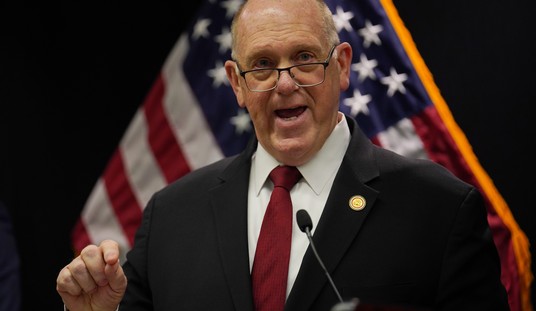When Condoleezza Rice became national security adviser and then Secretary of State, critics snickered at her background as an expert on the Soviet Union. What relevance would that have, they snickered, in a post-Soviet world? The George W. Bush administration got criticism for supposedly living in the Cold War past in regard to Russia, with the Obama administration and Hillary Clinton going so far as to offer a “reset button” to repudiate previous US policies toward Russia — while it still occupied the Georgia provinces of South Ossetia and Abkhazia, which it does to this day.
Fast forward five years, and suddenly Rice looks … very, very relevant. In today’s Washington Post, the former Secretary of State points out that Vladimir Putin may not be a new Soviet premiere, but he’s every bit as anxious to expand Russian domination as his communist predecessors — and that the West’s repeated signals of weakness are what encourages him to act to do so:
After Russia invaded Georgia in 2008, the United States sent ships into the Black Sea, airlifted Georgian military forces from Iraq back to their home bases and sent humanitarian aid. Russia was denied its ultimate goal of overthrowing the democratically elected government, an admission made to me by the Russian foreign minister. The United States and Europe could agree on only a few actions to isolate Russia politically.
But even those modest steps did not hold. Despite Russia’s continued occupation of Abkhazia and South Ossetia, the diplomatic isolation waned and then the Obama administration’s “reset” led to an abrupt revision of plans to deploy missile defense components in the Czech Republic and Poland. Talk of Ukraine and Georgia’s future in NATO ceased. Moscow cheered.
The seizure of Ukraine is a wake-up call, but Rice isn’t sure anyone’s answering:
The notion that the United States could step back, lower its voice about democracy and human rights and let others lead assumed that the space we abandoned would be filled by democratic allies, friendly states and the amorphous “norms of the international community.” Instead, we have seen the vacuum being filled by extremists such as al-Qaeda reborn in Iraq and Syria; by dictators like Bashar al-Assad, who, with the support of Iran and Russia, murders his own people; by nationalist rhetoric and actions by Beijing that have prompted nationalist responses from our ally Japan; and by the likes of Vladimir Putin, who understands that hard power still matters.
These global developments have not happened in response to a muscular U.S. foreign policy: Countries are not trying to “balance” American power. They have come due to signals that we are exhausted and disinterested. The events in Ukraine should be a wake-up call to those on both sides of the aisle who believe that the United States should eschew the responsibilities of leadership. If it is not heeded, dictators and extremists across the globe will be emboldened. And we will pay a price as our interests and our values are trampled in their wake.
The essay is almost too good to be excerpted. Be sure to read it all, as suddenly we’re discovering the consequences of the return to moral relativism in US foreign policy. It’s eerily similar to the Carter years, where an American President scolded his countrymen over their “inordinate fear of communism” in an attempt to “reset” the Cold War, and even kissed Soviet premiere Leonid Brezhnev on the cheek to show friendship after the SALT II agreement in June 1979. Brezhnev responded by invading Afghanistan in December 1979 to rescue a socialist revolution that had taken power in 1978. Carter’s response? A boycott of the Moscow Olympics.
Weakness never produces good results. History repeats itself, too, the first time as tragedy, and the second time as farce.








Join the conversation as a VIP Member